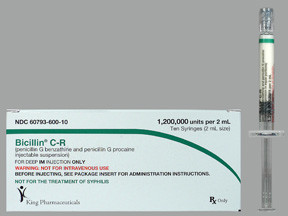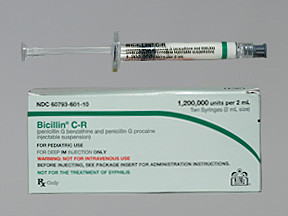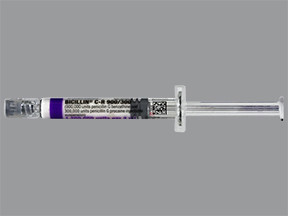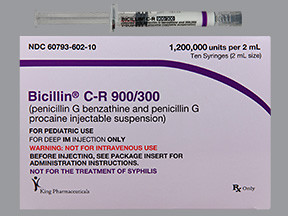PENICILLIN G BENZATHINE/PENICILLIN G PROCAINE - INJECTION
PHONETIC PRONUNCIATION: (pen-ih-SILL-in G BEN-zuh-theen/pen-ih-SILL-in G PRO-cane)
COMMON BRAND NAME(S): Bicillin C-R
GENERIC NAME(S): penicillin G benzathine/penicillin G procaine
Uses
USES: This medication is used to treat a wide variety of bacterial infections. This medication is known as a long-acting natural penicillin antibiotic. It works by stopping the growth of bacteria. This medication should not be used to treat sexually transmitted diseases (e.g., syphilis, gonorrhea).
How to use PENICILLIN G BENZATHINE/PENICILLIN G PROCAINE - INJECTION
HOW TO USE: See also Warning section. This medication is given by injection into a large muscle as directed by your doctor. The dosage is based on your medical condition and response to treatment. For children, the dosage is also based on weight. If you are giving this medication to yourself at home, learn all preparation and usage instructions from your health care professional. Before using, check this product visually for particles or discoloration. If either is present, do not use the liquid. Learn how to store and discard medical supplies safely. For the best effect, follow your doctor's directions for when to receive this antibiotic, and make sure to not miss any doses. Continue to receive this medication until the full prescribed amount is finished, even if symptoms disappear after a few days. Stopping the medication too early may result in a return of the infection. Tell your doctor if your condition persists or worsens.
Side Effects
Precautions
Interactions
Overdose
Images
Reviews
Faq for PENICILLIN G BENZATHINE/PENICILLIN G PROCAINE - INJECTION
Penicillin G benzathine/penicillin G procaine injection is used to treat various bacterial infections, including syphilis, strep throat, and certain respiratory tract infections.
This injection contains two types of penicillin antibiotics that work together to kill bacteria. Penicillin G benzathine provides a long-lasting effect, while penicillin G procaine provides a fast-acting effect.
The injection is usually given by a healthcare professional into the muscle (intramuscularly) or directly into a vein (intravenously) depending on the specific infection being treated.
Common side effects may include pain or swelling at the injection site, fever, rash, upset stomach, or allergic reactions. It's essential to notify your doctor if you experience any severe or persistent side effects.
Yes, it's important to inform your doctor if you have any allergies, especially to penicillin or other antibiotics. Additionally, let your doctor know about any medical conditions you have, such as kidney or liver disease, asthma, or a history of gastrointestinal issues.
It is generally considered safe to use penicillin G benzathine/penicillin G procaine injection during pregnancy or while breastfeeding. However, it's essential to discuss your situation with your healthcare provider for personalized advice.
The onset of action varies depending on the specific infection being treated. It may take a few days for the medication to fully start working, and it's important to complete the full course of treatment as prescribed.
No, penicillin G benzathine/penicillin G procaine injection is only effective against bacterial infections. It will not have any effect on viral infections such as the common cold or flu.
Yes, penicillin G benzathine/penicillin G procaine injection is a prescription medication that needs to be prescribed by a healthcare professional.
Warning
WARNING: This medication must not be injected into a vein or mixed with solutions that will be injected into a vein.
Disclaimer
IMPORTANT: HOW TO USE THIS INFORMATION: This is a summary and does NOT have all possible information about this product. This information does not assure that this product is safe, effective, or appropriate for you. This information is not individual medical advice and does not substitute for the advice of your health care professional. Always ask your health care professional for complete information about this product and your specific health needs.





No Reviews Yet